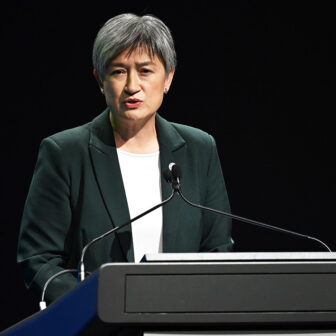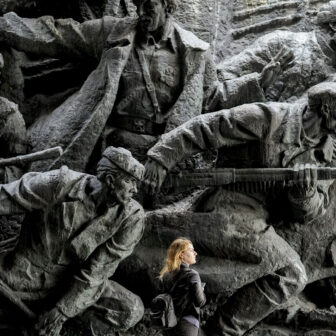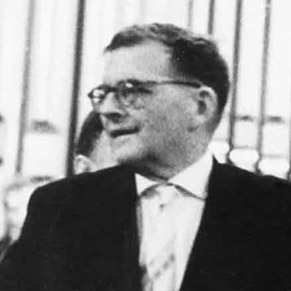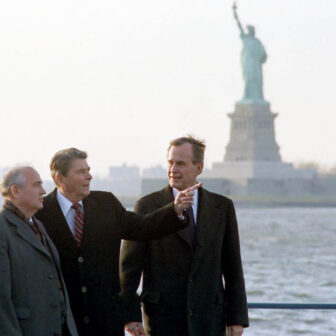By any standards the soldiers of the ADF’s Special Air Service regiment, or SAS, based in Perth, are elite troops. They are extraordinarily highly trained and extraordinarily multiskilled, possessed of all of the techniques — weapons and explosive skills, high-speed driving, parachuting, kayaking, communications and more — that can enable a handful of them to have a high impact and withdraw successfully. They are a tough, tough outfit. They have to be.
During a visit to their base in 1999, the chief of the defence force at the time, Chris Barrie, and I chatted to a corporal whose daily routine was to run the ten kilometres from his home to the base, do a day’s SAS training, and then run the ten kilometres home again. As their commanding officer commented, “These are not the types of people who put on their best performance when their girlfriend is in the stand and the crowd is cheering them on. They are the people who can keep going when they are wet, cold, tired, hungry, maybe injured, far from home, and no one is looking.”
Because of the nature of the work they do, they operate in great secrecy. We rarely read of their exploits, we never read of their techniques or capabilities, we never see photographs that would enable any individual to be identified, and we only find out their names after they have left the ADF.
Also because of the work they do, they have less of the regimented training and exercising of the mainstream infantry, and have greater freedom to innovate, and to acquire non-standard equipment and acquire it quickly. In the interests of maintaining and enhancing the capabilities that can give them an edge, they have a licence to cut certain corners.
This does not mean, however, that they have a licence to operate outside the boundaries of the Law of Armed Conflict. In the course of operations that depend on speed and surprise, and in which there is no front line, they must make split-second decisions that can result in innocent civilians being killed or injured. But there is no exemption from the requirement to treat captured insurgents or detained suspects humanely, and as far as possible to avoid harming the civilian population.
Unfortunately, by 2016 there had been sufficiently credible reports of soldier misbehaviour on operations for the chief of special forces, Jeff Sengelman, and the chief of army (now the chief of the defence force), Angus Campbell, to ask the inspector-general of the ADF to conduct a formal inquiry with the assistance of NSW Supreme Court judge Paul Brereton.
The allegations — detailed by Fairfax journalists in recent weeks — cover abuse of unarmed Afghan civilians, assault of a prisoner in custody, use of force beyond what is acceptable under the laws of armed conflict and, within the SAS itself, bullying and intimidation of fellow soldiers — and even a claim of one soldier assaulting another. Added to that are claims of a cover-up: claims that SAS patrols — typically groups of five or six men — may have failed to report accurately incidents in which Afghans had been subjected to the use of force, including acts of brutality perpetrated against unarmed men.
Generals Sengelman and Campbell would not have made the decision to establish the investigation lightly, and would have needed to be convinced that there was more to the allegations than scuttlebutt exchanged over a few drinks or, as has been counter-alleged, disgruntled soldiers smearing a tall poppy.
Incidents of the types that have been alleged are not to be tolerated, and the military leadership is to be complimented on taking them as seriously as they have. No matter how difficult the circumstances of the conflict — and these soldiers are fighting in very difficult circumstances — the rules concerning the treatment of adversaries, prisoners and civilians must be followed.
It is when the rules force inconvenient decisions that they perform their most valuable service. It is precisely because the circumstances are so difficult — fighting with no front line, not knowing who is friend or foe — that our soldiers must be scrupulous in their behaviour. Whatever outcome we are seeking in Afghanistan, it will not be achieved without the support and confidence of the Afghan people, especially the rural Afghans among whom we operate. For every one of these people we kill, assault or humiliate, we will have an extended family that hates us.
The allegations raise a fundamental issue for the ADF as a whole, of which I am sure the leadership will be acutely conscious. No unit, no matter how valuable, can be permitted to make its own rules. If they set out to do so, they are setting themselves up as a rival power centre (“Doesn’t matter what the hierarchy says, this is the way we do things”) and no organisation can tolerate that. The chief of the defence force’s writ must run throughout the ADF; if he says (as I’m sure he does) that we must abide by the Law of Armed Conflict, treat prisoners appropriately and so on, then that is what must happen. And the leadership must support those soldiers who blow the whistle on misbehaviour by taking their claims seriously.
For the nation as a whole, it is in our interest to treat all foreign combatants as we would expect others to treat ours. Atrocities perpetrated by our adversaries do not excuse misbehaviour by our soldiers: we are supposed to be better than them.
To me, the ambiguity of modern warfare and the vagueness of our mission in Afghanistan, as elsewhere, raise yet another issue. To my mind, it is not acceptable to ask young Australians to go overseas to kill people without a clear sense of an achievable purpose that has been tested by debate in parliament, and without any deployment being authorised by parliament. We cannot continue to allow deployment decisions to be made, as the deployment to Afghanistan was, at the whim of the prime minister of the day. •




